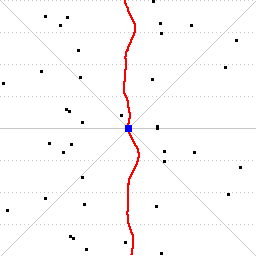"Bad" Framings
And how to spot them
Marco Giancotti,

Marco Giancotti,
Cover image:
Komposition (1930), Otto Freundlich
Of all the problems in physics, one of the thorniest over the course of centuries was figuring out what in the world this thing we call "light" is. In the late 17th century, Christiaan Huygens observed that light has some very wave-like properties, like refraction and diffraction, so he hypothesized it must be a wave, moving in some kind of invisible liquid—a so-called "aether". Thus the aether debate began.

Only a few years later, Newton rejected Huygens' theory because it didn't explain certain properties of light. On top of that, Newton was an expert in the motion of planets, and imagining all planets immersed in a liquid would have wrecked havoc in his newly-discovered equations. He claimed that light is made not of waves but particles, which don't need an aether in order to propagate. He still believed in an aether, though, but one that didn't interfere with the planets, and only disturbed light in certain cases, explaining its weird wave-like behavior.
A while later other eminent scientists found a way to fix the wave interpretation of light, solving some of the problems pointed out by Newton. As for the question of planet motion, they hypothesized that the aether might be an exotic kind of liquid, one that opposes little resistance to slow-moving celestial objects, but is almost solid-like for something as fast as light. This allowed the planets to "drag" the aether along with them, while still letting light propagate as high-frequency waves. This idea sort of worked mathematically, but at the cost of more and more complexity.
The debate went on, swinging back and forth for generations. Every now and then there would be an experiment that cast doubt on the latest theory, and the tide would turn. Very intelligent physicists would make modifications to the theory, throw away some parts and add new assumptions, just to make aether work in some way. Only at the beginning of the 20th century Albert Einstein appeared with his special theory of relativity, and explained things without needing to even mention an aether. With that, he unblocked everything, and the concept of a light-carrying medium became mostly obsolete.
What changed throughout this process, and why did it take so long? The boring answer is that they initially didn't have enough evidence, and once they did, they puzzled it all out. That's certainly true, but one can imagine them getting closer to the "right" theory much earlier, and by doing so they might have designed the necessary experiments earlier, too, confirming their predictions.
The better answer to my "what changed?" question is, I think, that Huygens and Newton and all the others had settled into a bad framing, and Einstein replaced it.
A framing is a choice of boundaries: you make up a way to categorize things around you in order to achieve some goal of yours. Those theories were all based on a framing in which something can be a wave or a particle, with a clear, mutually-exclusive boundary between the two behaviors. They also attached a label around this mysterious thing they called "aether", and treated it as a real object. Because of that, their models had to be about the properties and relationships between the aether and the waves rippling on it, or the particles speeding through it.

At the same time, those theories didn't have a labeled boundary around "spacetime", so the fact that spacetime might have its own properties and interactions with other things was not even contemplated. Spacetime was part of the immutable background. Einstein's great leap was to start with a new framing, one without a name for whatever "aether" was meant to be, and giving "spacetime" and "frames of reference" first-class citizenship in his theory. After that, theory and experiments finally clicked into place in a way that surpassed expectations, and the enormous advances of 20th-century physics began.
In my first post explaining framings, I wrote:
How can a framing be "better" or even just "good"? If they are all subjective simplifications and projections onto reality of boundaries that don't really exist, does it make sense to say that a framing is, in absolute terms, "good" or "bad", "true" or "false", "right" or "wrong"?
No, in fact, I don't think it makes sense. How you draw the lines is up to you, and it has nothing to do with morality or accuracy. But a framing can be more or less effective at achieving a given goal. A framing is effective if and when it lets you pick out meaningful differences that you would otherwise overlook. You judge it by how well and how easily it lets you simulate the parts of reality you want to predict. Even when looking at the same corner of reality, another person, with different goals, might find a different framing to be more effective.
[bold emphasis added]
In absolute terms, judging a framing as "good" or "bad" is meaningless. The same terms, however, can work just fine if you specify the goal you apply a framing to. When Huygens published his Treatise on Light in 1690, where he first proposed the idea of light waves in an aether, the framing was great (read: effective) for his purpose at the time. Light does behave as waves in many ways, and Huygens' Treatise was a foundational work of great historical importance for physics. Newton, however, wanted to explain planetary motion with much higher accuracy than had ever been done before, so a liquid aether wasn't a good framing for him.
The same goes for most other proposals in the debate, like Newton's idea about light as particles—we know today that light also behaves as particles, the wave-particle boundary having been ditched with quantum physics. None of those framings was "bad" in absolute terms, and many were "good" within a limited scope. But every time new evidence appeared from experiments, the goal would be changed to explaining those results, and all past framings came up short.
One sign of a bad framing (given a purpose) is confusion. Things don't add app, they don't convince you. This is the easy case, because it's easy to recognize your own confusion, and you can keep working on your framing until you aren't confused any more. Often, that's enough: it took more than 300 years, but we now have a convincing understanding of light that works just fine for most purposes. Physics is very good, or at least inexorable, at fixing these cases of poor framings.
But a sneakier sign of a bad framing is an endless debate. Two or more parties keep on arguing that their conclusions are right and the others' are wrong. This one is trickier to solve from the inside, because each side of the debate might be very convinced of their logic—there isn't much confusion involved, nor clear new evidence to puzzle you too much.
An example of a long-running debate is that of nature vs nurture: are human behaviors and traits due more to genes or to the environment?
Another one is the quest for a perfect scientific definition of "life": how do you decide if something is alive or not?
Or the debate about liberalism and conservatism: should the government dictate certain things or leave them up to the people?
Or free will vs determinism, or what constitutes "art", or "why does it feel like something to be conscious?", and so on with all the famous debates even now raging in all areas of knowledge. Such chronic disputes tend to happen especially in the softer sciences, or on topics for which clear, tangible evidence is scarce.
All of these debates have not been resolved even after decades or centuries of deep thinking and dialog between (sometimes) intelligent people. And most will never be resolved, because the people involved have different purposes in mind, and have sharpened their framings for those separate goals. Given that your opponents have agendas different from yours, of course the framings they propose will be "bad" for you.
The sneaky part is that each side employs the same words to refer to boundaries that were drawn differently. The framings they use, as they stand, are incompatible, but the people involved do not (or refuse to) see that, engrossed as they are in explaining their flawless models build on top of those incompatible foundations.
The way you define, say, "intelligence" will have different uses for a roboticist, a zoologist, and a SETI researcher. Why would a single definition be guaranteed to exist?
Some may argue that all debaters have the shared goal of getting to the truth. The catch is that the way they define "truth"—another choice of boundaries—is itself relative. I don't think it's a cynical take to say that people never really need pure Truth, for its own sake, but something more practical, like a theory that predicts certain things well, or answers to certain questions of personal interest, or money, influence, and all the other worldly desires.
But even if everyone agreed on seeking an ultimate truth, the fact that people can't reach it even after spending eons in reasoned arguments smells of bad framing again.
Cases of sneaky bad framings aren't that hard to spot from the outside, precisely because both sides go on forever without being able to reconcile their views with each other even a little. That's the tell-tale sign, the hint that they should stop discussing their arguments and begin discussing what each faction is trying to achieve—what they really mean when they use those words that they take for granted. Without first aligning on that, no progress can be expected in a debate. Rationality fails at the edges. ●
Cover image:
Komposition (1930), Otto Freundlich

Comments
Loading comments...